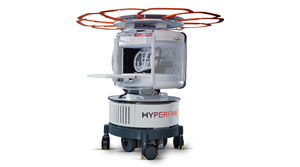Some worry that FDA’s open door may not be so open under the new administration.
January 1, 2009
WASHINGTON WRAP-UP
|
With a crumbling economy, reform at government agencies such as FDA seemed pretty low on the incoming Barack Obama administration's scale of priorities when this column went to press. But one pertinent goal was blazing bright: an end to regulated industry's special access to such agencies.
For medical device companies, that access was never better expressed than it was on March 3, 2004, by FDA's acting commissioner Lester Crawford in a satellite broadcast to the annual meeting of AdvaMed in Scottsdale, AZ. That's when Crawford proclaimed that both he and the agency admired this industry and how his door was always open to it.
“Yes—we have an open-door policy,” he told a questioner from the AdvaMed audience. “Unfortunately, there are a lot of people in the door!” He went on to boast that he was the only FDA commissioner to have his home telephone number listed in the phone book—“So give me a call!” Of course, Crawford was later driven from office in disgrace.
The likely reversal of such accessibility was signaled on the Obama transition team's Web site, www.change.gov, barely a week after the election. The team posted the following account of a press conference with its cochair, John Podesta:
[A] reporter asked Podesta about complaints from lobbyists who claim they have relevant expertise and say the policy leaves them “out in the cold.”
“So be it,” Podesta said, adding that the president-elect intends to enforce this policy in his administration so that the “revolving door ceases to exist.”
Admittedly, there's a difference between the access of lobbyists-for-hire and that of an industry captain seeking relief from unreasonable bureaucrats. But I expect it to be a difference without a distinction in the months ahead.
I remember Carter administration FDA appointees cheerfully lecturing industry audiences about the benefits of “a healthy tension” between regulator and regulatee. I expect such benefits will be freshly cherished by Team Obama in a postbailout world.
It's a change that won't require either congressional assent or Department of Treasury funding.
CDRH Staff Charge High-Level Misconduct
|
CDRH dissidents were unhappy with their response from von Eschenbach and took their case to several congressmen this past fall. |
CDRH physicians and scientists have complained to FDA commissioner Andrew von Eschenbach (whose resignation is effective January 20) that their attempts to use sound science in evaluating medical devices have been thwarted by nonscientific CDRH managers and executives. Anonymous protests by drug reviewers at the agency have also complained about so-called “top-down directed” reviews.
The CDRH dissidents also charged that there had been reprisals for their complaints to the commissioner. Denied a satisfactory response from von Eschenbach, they took their case in the fall to House Energy and Commerce Committee chairman John Dingell (D–MI) and Oversight and Investigations Subcommittee chairman Bart Stupak (D–MI), who have started their own investigation.
In a letter to Dingell, which was redacted by his staff to protect the dissidents' identities, the employees said that their managers had “failed to follow the laws, rules, regulations, and agency guidance to ensure the safety and effectiveness of medical devices and consequently, they have corrupted the scientific review of medical devices.”
|
They said they had amassed significant documentary evidence that CDRH managers have corrupted and interfered with the scientific review of medical devices. Managers with no scientific or medical expertise in devices or any clinical experience in medical practice have ignored serious safety and effectiveness concerns of FDA experts and have ignored scientific regulatory requirements, they claim.
And to avoid accountability, these same managers “ordered, intimidated, and coerced FDA experts to modify their scientific reviews, conclusions, and recommendations in violation of the law. Furthermore, these managers have also ordered, intimidated, and coerced FDA experts to make safety and effectiveness determinations that are not in accordance with scientific regulatory requirements,” the CDRH employees allege.
The dissident staff members also said that the managers made FDA experts use unsound evaluation methods and accept data that were not scientifically valid or obtained in accordance with legal requirements. One such requirement mentioned was obtaining proper informed consent from human subjects. “These same managers have knowingly avoided and failed to properly document the basis of their decisions in official agency records.”
The physicians and scientists said they wrote to von Eschenbach about their concerns at the end of May and he assigned assistant commissioner for integrity and accountability William McConagha to investigate. McConagha reportedly characterized the evidence he was given as “compelling,” “convincing,” and “sufficient” to justify curative and disciplinary actions.
In early September, the physicians and scientists said, they met with CDRH director Daniel Schultz in the presence of representatives from the commissioner's office and presented the issues and evidence to him. They said Schultz conducted his own investigation and concluded that the physicians and scientists needed to “move forward” without him taking any curative or disciplinary action.
|
CDRH dissidents said Schultz exacerbated the situation “by knowingly allowing |
The dissidents also said that Schultz had “aggravated the situation by knowingly allowing a continuation of management reprisals,” which included removal and threatened removal of physicians and scientists as well as illegal and improper employee performance evaluations. Given this situation, the dissidents again contacted von Eschenbach on September 29 and later contacted Dingell and Stupak.
“These allegations are deeply concerning, and we intend to uncover whether any FDA activity has compromised the health and safety of American consumers,” Dingell said when announcing his investigation. “I commend the FDA scientists for courageously sounding the alarm on what appears to be a serious problem. I look forward to pursuing the steps necessary to ensure that the medical devices Americans depend on are safe and effective.”
Stupak said earlier committee investigations have found that FDA has “allowed contaminated food and unsafe drugs to enter the market, and now serious allegations have been raised about the scientific integrity of the FDA medical device approval process. Although FDA has launched its own investigation into this matter, no corrective action has been taken. The committee intends to learn what action FDA plans to take to ensure the integrity of the medical device approval process and prevent retaliation against the scientists who blew the whistle on these activities.”
According to the employees, McConagha may have supported the removal of some CDRH managers, given the seriousness of the charges and the credibility of the evidence. “Certainly, our preliminary witness interviews and document review confirm that sweeping measures may be necessary to address the distortion of science alleged by so many CDRH scientists,” they wrote. “Consequently, we urge you to take the necessary immediate actions with respect to management, procedural, and organizational changes necessary to assure the safety and effectiveness of medical devices and a restoration of FDA's mission.”
The representatives reminded von Eschenbach that it is a violation of federal law to retaliate against whistle-blowers, to interfere with a congressional inquiry, and to deny or interfere with employees' rights to furnish information to Congress. They asked to be briefed by McConagha no later than December 1 on actions FDA has taken or intends to take in response to the allegations.
An undisclosed number of CDRH physicians and scientists say center managers have ignored sound science and forced approval of devices that could hurt consumers.
Nader Group Lobbies against Device Approval
|
Acorn's CorCap device (known as the heart sock) is a mesh wrap that encloses the heart to provide muscle support and reduce ventricular enlargement. |
Eight days after Barack Obama's election, the Ralph Nader Public Citizen organization's Health Research Group (HRG) wrote CDRH director Daniel Schultz to express its concern over the center's willingness to back further study and possible approval of Acorn Cardiovascular's CorCap cardiac support device. It's an unusual intervention in the midst of a transition that could show how “politicized” FDA's management has become.
The letter described the device as a mesh support sock sewn around the heart during open-heart surgery for dilated cardiomyopathy. It noted that not only had two FDA advisory committees recommended against approval, but the agency itself has rejected approval three times.
Despite such setbacks, HRG deputy director Peter Lurie said CDRH had counseled Acorn on how to conduct a new study and to submit another premarket approval application—potentially leading to approval of the device without further advisory committee review.
“We are extremely concerned that FDA may approve a device that a study has failed to demonstrate is safe or effective,” Lurie said. “In the only significant study of CorCap done to date, the device failed to help patients with enlarged hearts and put them at risk for surgical scarring and heart constriction.”
|
Although FDA had suggested that it could approve CorCap based on results of the new trial, Lurie said that with only 50 CorCap patients, the trial would be too small and would not last long enough to provide convincing data. He also complained that it does not have an appropriate control group and that investigators will know that the patients have received CorCap, introducing possible bias into the study.
“The proposed clinical trial is so poorly constructed that it is unlikely to provide any meaningful data to contradict the negative findings of the first study,” said Public Citizen research associate Eunice Yu. “Subjecting more patients to an experimental therapy that has little hope of producing meaningful data is irresponsible.”
The letter said that FDA approving the device without further advisory committee review would be a clear abdication of the agency's role to protect the public based on sound scientific evidence.
Since the Reagan era, FDA managers have been pulled steadily in the direction of accommodating sponsors of regulated products. Some exceptions come to mind, such as Utah Medical Products and TMJ Implants, but the influence of industry user fees has generally reinforced that syndrome.
With growing concerns about product safety at FDA and a few marketing scandals and consequent million-dollar punitive court settlements elsewhere, Nader's organization may expect to flex more muscle than it has had in many years.
AdvaMed Seeks More Details in HDE Guidance
AdvaMed says FDA should expand its draft guidance on humanitarian device exemption (HDE). The group says that the document, titled Draft Guidance for Humanitarian Device Exemption Holders, Institutional Review Boards, Clinical Investigators, and Food and Drug Administration Staff; Humanitarian Device Exemption Regulation: Questions and Answers, should include a statement about the level of evidence and type of data necessary for HDE approval.
AdvaMed says the lack of a clearly defined standard hinders the use of the HDE program as a pathway to market for devices that treat or diagnose diseases and conditions affecting fewer than 4000 patients, including pediatric populations and subpopulations. And without such guidance, it says, demands for evidence can continue to drift upward until they begin to resemble expectations for a premarket approval filing, as has already been reported by some manufacturers.
AdvaMed suggests that FDA state that prospective randomized controlled clinical trials generally will not be necessary to demonstrate probable benefit to health. In addition, the group says FDA and industry should consider nonclinical data, published literature, historical data and patent records, surrogate endpoints, and statistical methods and evidence from experience with similar devices. This is consistent with the agency's least-burdensome policies derived from the FDA Modernization Act of 1997.
The medical device advocacy organization also calls for the addition of a question and answer explicitly stating that an HDE has FDA approval, which may help doctors and facilities seek reimbursement from insurers.
The comment letter contains detailed recommendations for changes to specific sections of the agency's draft guidance.
AdvaMed's letter can be accessed at www.regulations.gov/fdmspublic/, where visitors can ask for the document FDA-2008-D-0434-0002.
Nidek, Doctors Sued over FDA Issues
Japan-based ophthalmic device manufacturer Nidek, 13 eye doctors, 4 surgical facilities, and 1000 unidentified parties are being sued in southern California federal court on six class-action complaints. The suit arose from allegations that they used Nidek ophthalmic devices for procedures not approved by FDA.
In Perez et al. v. Nidek et al., the plaintiffs allege that notwithstanding FDA warning letters in 2000 and 2001, the defendants altered Nidek ophthalmic lasers to treat farsightedness via LASIK without FDA approval. The agency had only approved the devices to treat nearsightedness.
The suit alleges that because Nidek had annual service contracts on the lasers under which physicians paid $30,000 to $70,000 for “several” service visits a year, “Nidek was well aware that the defendant physicians and other...physicians were using the laser to perform unauthorized hyperopic treatments...without giving patients proper informed written consent and/or including them in an FDA clinical trial.” It alleges that Nidek technicians swapped out approved myopic chips in the lasers for unapproved hyperopic chips.
A warning letter from December 20, 2000, the complaint says, spoke of “ease by which illegal chips may be replaced in previously distributed units, thereby enabling these devices for indications beyond which they have been cleared.” FDA determined Nidek and its agents, and the physicians and their agents, were aware and/or using the laser to perform hyperopic corrections for several months before reporting the situation to FDA.
Nidek's actions included disabling FDA-approved “lock out” or “block” software and falsifying service records, the suit charges.
The suit also declares that the agency was “growing increasingly concerned that illegal chips are too easily replaced in Nidek units and replacement chips have become too widely available.” Two sets of warning letters about the problem were sent to physicians seven months later, the suit says, and in December 2001, the agency issued an import alert on the Nidek laser.
Filed by attorney Duane Admire of Del Mar, CA, under state and federal statutes, the lawsuit seeks unspecified damages, punitive damages, and attorneys fees.
FDA Faults STERIS Isomedix
A recent FDA warning letter says a June 4–17 inspection at STERIS Isomedix's sterilization facility in Coventry, RI, found quality system violations. The agency's New England office cited the company for the following:
Failure to establish and maintain adequate procedures to control product that does not conform to specified requirements.
Failure to establish and maintain adequate procedures to identify all the actions needed to correct and prevent recurrence of nonconforming product and other quality problems.
Failure to establish and maintain adequate acceptance procedures to ensure that specified requirements for in-process product are met.
Failure to adequately validate computer software used as part of production.
FDA said the company's responses to the inspection observations were either inadequate or could not be evaluated due to lack of evidence of changes made.
The district office also acknowledged that while it had said in an August 5 letter that the company's responses were adequate, “upon further review, we realized that the deficiencies discussed above warranted this warning letter to bring these violations to your attention.”
STERIS was told to respond with a list of steps taken to correct the problems and an explanation of how it will prevent them from happening again.
Finished Device Acceptance
FDA also cited STERIS for failure to establish and maintain adequate procedures for finished device acceptance. The procedures ensure that each production run, lot, or batch of finished devices meets acceptance criteria. Finished devices are not to be released for distribution until they meet the following conditions: (1) the activities required in the device master record are completed; (2) the associated data and documentation are reviewed; (3) the release is authorized by the signature of a designated individual; and (4) the authorization is dated.
Copyright ©2009 Medical Device & Diagnostic Industry
About the Author(s)
You May Also Like








